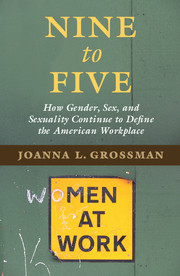Book contents
- Frontmatter
- Dedication
- Contents
- Foreword
- Acknowledgments
- Introduction
- PART I WHAT IS SEX DISCRIMINATION?
- 1 Sexual Jealousy
- 2 Too Hot to Be a Dental Hygienist?
- 3 A Twist on the Problem of Sex Inequality in Coaching
- 4 Mixed Motives
- 5 Sex Stereotyping and Dress Codes
- 6 A Victory for Transgender Employees
- 7 How Fast Must Female Transit Officers Run?
- 8 Who Is Protected by Antidiscrimination Laws?
- 9 Punishing the Coach Who Stood Up for His Female Athletes
- 10 Broader Protection against Workplace Retaliation
- 11 The Supreme Court Protects Retaliation Victims but Still Leaves Gaps in the Law
- PART II SEXUAL HARASSMENT
- PART III PREGNANT WOMEN AND MOTHERS AT WORK
- PART IV FEMALE BREADWINNERS AND THE GLASS CEILING
- Conclusion
- Notes
- Index
8 - Who Is Protected by Antidiscrimination Laws?
from PART I - WHAT IS SEX DISCRIMINATION?
Published online by Cambridge University Press: 05 May 2016
- Frontmatter
- Dedication
- Contents
- Foreword
- Acknowledgments
- Introduction
- PART I WHAT IS SEX DISCRIMINATION?
- 1 Sexual Jealousy
- 2 Too Hot to Be a Dental Hygienist?
- 3 A Twist on the Problem of Sex Inequality in Coaching
- 4 Mixed Motives
- 5 Sex Stereotyping and Dress Codes
- 6 A Victory for Transgender Employees
- 7 How Fast Must Female Transit Officers Run?
- 8 Who Is Protected by Antidiscrimination Laws?
- 9 Punishing the Coach Who Stood Up for His Female Athletes
- 10 Broader Protection against Workplace Retaliation
- 11 The Supreme Court Protects Retaliation Victims but Still Leaves Gaps in the Law
- PART II SEXUAL HARASSMENT
- PART III PREGNANT WOMEN AND MOTHERS AT WORK
- PART IV FEMALE BREADWINNERS AND THE GLASS CEILING
- Conclusion
- Notes
- Index
Summary
The U.S. Court of Appeals for the Seventh Circuit has suggested that some law firm partners may qualify as “employees” for purposes of federal antidiscrimination law. The colorful opinion, written by Judge Richard Posner, was issued in the case of EEOC v. Sidley Austin Brown & Wood.
The decision is certain to inspire fear in law firms across the country. If partners indeed qualify as firm “employees,” that means they can sue their firms under laws such as the Age Discrimination in Employment Act (ADEA); Title VII, the major federal antidiscrimination statute; and other federal laws that only “employees” can invoke. Historically, firms have been virtually immune from lawsuits based on decisions relating to their own partners. That immunity would be gone. And although obvious beneficiaries of the recent ruling are older lawyers, who may be able to challenge a variety of practices common to law firm partnerships, women and minorities who are likely to be at lower rungs of the partnership ladder may benefit, as well.
THE FACTS OF THE SIDLEY CASE
The case arose when the law firm of Sidley Austin Brown & Wood decided to demote thirty-two equity partners (most of whom were over age fifty) to “counsel” or “senior counsel.”
The EEOC subsequently began an investigation. It issued a subpoena to Sidley, seeking information relating to two issues: First, did the demoted partners qualify as employees under the ADEA? Second, were the demotions undertaken on the basis of age? The EEOC sought information relating not only to the demotions but also to the firm's mandatory retirement policy, as well.
With respect to the first issue the subpoena addressed, Sidley complied only in part. It argued that the EEOC had sufficient information to determine that the partners were “true partners,” and, therefore, were not protected as employees under the ADEA. With regard to the second issue, Sidley provided no information, on the theory that because the partners were not “employees,” the EEOC had no jurisdiction to conduct the investigation, because none of the statutes the agency enforced could apply.
The EEOC then applied for an order to enforce the subpoena, and the district court ordered the firm to comply in full.
- Type
- Chapter
- Information
- Nine to FiveHow Gender, Sex, and Sexuality Continue to Define the American Workplace, pp. 45 - 50Publisher: Cambridge University PressPrint publication year: 2016



